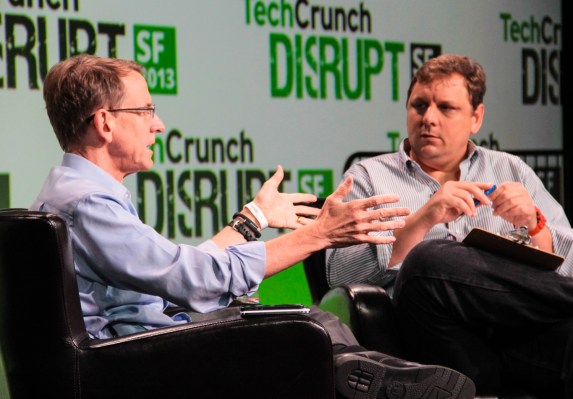When all else fails for your company, look to the heavens. Zynga — the social gaming company that has in the last several months changed its CEO, laid people off, pulled back from original strategic plans and struggled with waning interest in its gaming franchises amid competition from newer entrants — has seen its stock drop by nearly 70% since it first went public in December 2011. Today, one of its board members, John Doerr, spelled out the top-line priority for the company: “We have to get Zynga’s stock price to where God intended it to be,” he said, not for the first time.
Doerr, a partner at Kleiner Perkins Caufied & Byers who had been one of Zynga’s investors before it went public — KPCB still holds some 60 million shares — took his role with the company up another level in April 2013, when he joined Zynga’s board of directors, joining KPCB colleague Bing Gordon.
Speaking on the stage today at TC Disrupt, Doerr said since then he has been to three board meetings and “half a dozen other meetings,” but declined to give a view on what the company might do next to claw its way back to the top.
So his interviewer, Michael Arrington, instead asked about the temper of Mark Pincus, the former CEO and founder who got replaced in July by Don Mattrick, an exec from Microsoft. “I’ve never seen him yell,” Doerr laughed. “Pincus loves working with Don. We need both of them.” Pincus is now the chief product officer so he is still around.
In the same interview, Doerr was very bullish on enterprise startups as opportunities for future investment, zeroing in on areas like healthcare, education and technology/hardware advancements as three areas where KPCB is most interested. So where does that leave consumer? Still a big area, especially in terms of the existing portfolio. He also gave a rundown on how some of those existing investments are performing:
Flipboard, he said “is doing well,” with 85 million users and over 1m creating magazines of their own for public consumption. There have been almost 3 million magazines created, he said. “The web is huge and on average not interesting,” he said, claiming Flipboard was a route to offering a curated tour of it.
Another is MyFitnessPal, which raised $18 million in August 2013 from KPCB and Accel. It now has 45 million users (adding 5 million in the last month). Those users have collectively lost 100 million pounds, he says. No comment on how many of those pounds may have been gained back.
